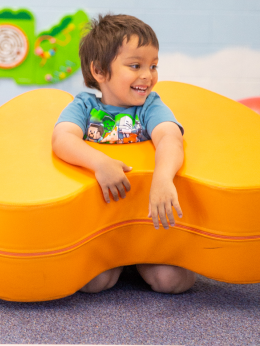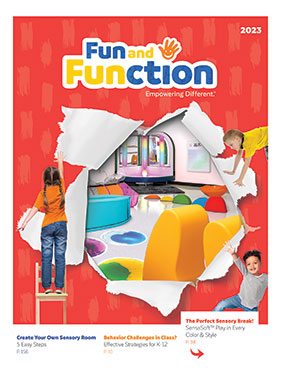Exercise is a relatively modern day need born from our sedentary lifestyles. Though we no longer hunt and gather for survival, our bodies need to move, lift and carry heavy things in order to thrive.
Fortunately, we can turn everyday chores into opportunities for "heavy work" that benefit our mind and body. Heavy work puts pressure on your muscles and joints as you move, providing proprioceptive input for self-regulation.
Many sensory motor tools provide the benefits of heavy work such as weighted vests, compression, pressure rollers and putty.
Chores provide heavy work too – and teach responsibility and work ethic. And here's the best part: you are never too young nor too old to do chores. Plus when you're done, something has actually been accomplished.
Let's take a look at some chores for different age groups:
Little Kids (Ages 3-6):
This group is just learning how to help out. It's important to remember that the result is not nearly as important as the journey or, in this case, the effort. Be consistent and compliment the effort. For this age you can collect toys, dump clothes into a laundry basket or carry a laundry basket to the laundry room, put clothes away, help set the table, clean up after eating, help make a bed, dust, decorate a cake, help water the garden, load the dishwasher, feed and help care for a pet, water plants, empty a trashcan or gather school items. If your little one has a hard time getting started, you may want to do a bit of gross motor work to warm up their muscles, sing a little song or help a little. And it's ok if you have to go back and complete the chore after them. The key is consistency.

Elementary School Kids (Ages 7-10):
This group now needs to know that chores are mandatory and there should be some feedback based on quality of the job. Continue with positive feedback but also implement consequences for jobs poorly done or missed. In addition to the chores from the younger group: tidy the bathroom when you're finished, clean the sink, sweep or mop the floor, collect clothing, look after younger siblings, wash dishes, help out with a fix-it job, load the washing machine and dryer, run an errand to a neighbor, change bed sheets, make a lunch or sandwich, wash the car. You can reward this group with something fun when they are done as their goal will be to finish so they can play.

Tweens/Teens (ages 11+):
Now it's time to prepare for adulthood. Chores should be accomplished independently and consistently. But be prepared for resistance and lag, as this group will do their best to revolt against any rules. Stay positive and stay consistent. Be a good listener but ignore any whining or constant complaining. In addition to the chores from the other age groups: do your own laundry, make small household repairs, clean the stove/oven/refrigerator, cook a complete meal, babysit, help a loved one or an elderly neighbor, clean out the car, do yard work. For this older group, chilling after it's done may be reward enough – though the lasting rewards will be apparent years later when they have a household of their own.

Remember that chores can also be fun. It depends upon the age, the environment and the child's personality. Chores are important not just for their heavy work benefit but for providing life skills and sharing responsibility.
Also, check out our Chore Bingo Cards for Heavy Work!



















Comments